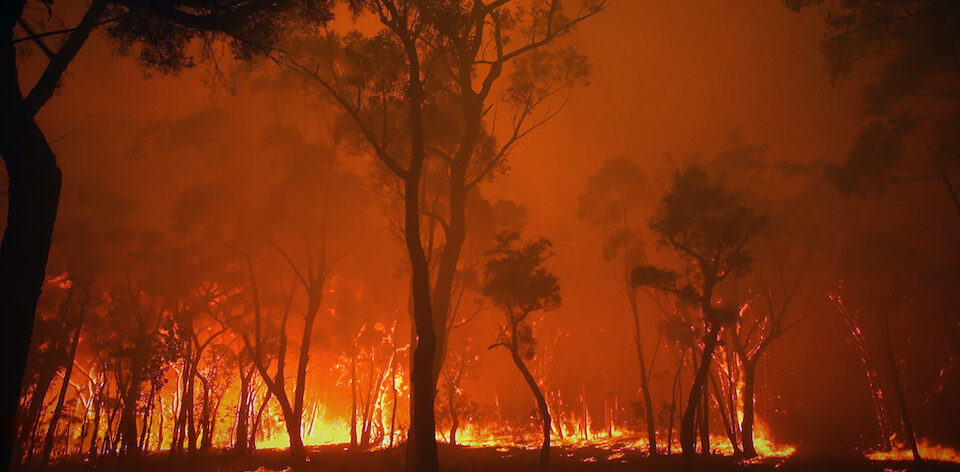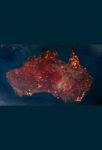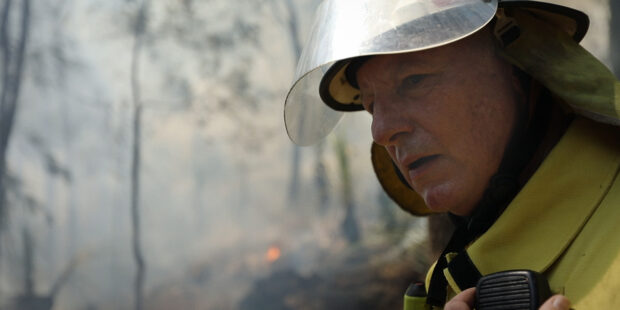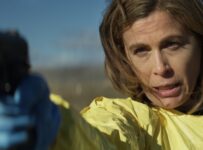The summer of 2019/2020 in Sydney is still so vivid for me, and most Australians. The bright orange skies. The constant cover of smoke for over three months. Having to wear masks outdoors was an ill omen of what the rest of 2020 and 2021 would bring. In early January 2020, we drove through areas where cars and train carriages had been gutted by fire, and the burnt landscape seems to go on forever.
Bushfires have been a way of life in Australia as long as I can remember, yet this one was different. It felt like the culmination of years of unheeded warnings all coming to fiery fruition at once. In BURNING, documentarian Eva Orner (Chasing Asylum) paints Australia as “ground zero for climate change.” Indeed, before tackling the ‘Black Summer’ directly, Orner gives a potted history of the longer and more dangerous seasons that saw record fires ravage parts of the country in 1994, 1997, 2001, 2003 and 2009.
Systematically chronicling numerous decisions Prime Minister Scott Morrison’s Liberal government made in the lead-up to a potentially preventable disaster, the film and Orner casts the the government as a group that listened to mining interests while refusing to address the climate crisis literally burning around them. Various media clips show that previous governments may have questioned the “genuine concern” of climate change, or referred to the discourse as “fragrant.” Yet the most damning footage comes from a 2017 session of parliament in which Morrison gave a speech against the ‘ills’ of ‘coalophobia,’ while later campaigning against electric cars.
To explain the impact of the fires, Orner has assembled a diverse group of commentators. Former Fire Commissioner Greg Mullins emotionally relates personal stories of colleagues lost, or trees that “have been like an arc through space and time” drying up. Tim Flannery and Bruce Pascoe speak to climate change and Indigenous land management respectively. Daisy Jeffries, who was one of the leaders of the school climate strikes, speaks to the hopes and fears of a generation inheriting this crisis. Eyewitnesses and people directly impacted by the fires have their own heartfelt tales to tell.
Some may feel that this documentary is a one-sided attack, especially given that there are no representatives of the Liberal government interviewed for the picture. (They do appear via archival footage and we’re told that Morrison declined to be interviewed). If anything, there were probably grounds for Orner to go even further, especially when she tacitly credits the government’s ‘socialist’ responses to Covid as the kind of action lacking in the climate discussion.
It was the pandemic that ultimate put a halt on any of the momentum gained in the climate discussion, and for the moment very little has changed. BURNING doesn’t offer any radical departures from coverage so far, but as an oral history it will stand as a record of a moment in time. As Australia braces for another hot summer, it’s a record that an anxious nation undoubtedly hopes won’t be repeated.
2021 | Australia, USA | DIRECTORS: Eva Orner | CAST: Tim Flannery, Bruce Pascoe, Mark Graham, Greg Mullins, Daisy Jeffries | DISTRIBUTOR: Amazon Studios, TIFF 2021 | RUNNING TIME: 86 minutes | RELEASE DATE: 9 September – 18 September 2021 (TIFF 2021)







